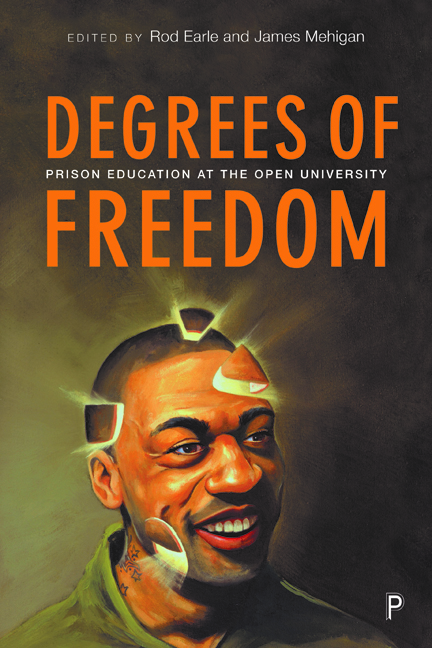Book contents
- Frontmatter
- Dedication
- Contents
- Notes on Contributors
- Acknowledgements
- 1 Openings and Introductions: Education for the Many, Prison for the Few
- 2 From Prisoner to Student
- Vignette 1 Choosing My Journey
- 3 Pioneers and Politics: Open University Journeys in Long Kesh During the Years of Conflict 1972–75
- Vignette 2 Avoiding the Mind-Numbing Vortex of Drivel …
- 4 A University Without Walls
- Vignette 3 Starting a New Chapter
- 5 Open Universities, Close Prisons: Critical Arguments for the Future
- Vignette 4 Out of the Abysmal
- 6 The Light to Fight the Shadows: On Education as Liberation
- 7 From Despair to Hope
- Vignette 5 Making my Commitment
- 8 Straight Up! From HMP to PhD
- 9 From Open University in Prison to Convict Criminology Upon Release: Mind the Gap
- Vignette 6 Message to a Prisoner
- 10 From the School of Hard Knocks to the University of Hard Locks
- 11 Becoming me with The Open University
- Vignette 7 Catching up with Kafka
- 12 From D102 to Paulo Freire: An Irish Journey
- Vignette 8 My Journey, My New Life
- 13 Ex-Prisoners and the Transformative Power of Higher Education
- Vignette 9 Prison Choices: Taking a Degree or Packing Tea?
- 14 What the OU did for me
- Appendix Study with The Open University
- Index
7 - From Despair to Hope
Published online by Cambridge University Press: 11 March 2021
- Frontmatter
- Dedication
- Contents
- Notes on Contributors
- Acknowledgements
- 1 Openings and Introductions: Education for the Many, Prison for the Few
- 2 From Prisoner to Student
- Vignette 1 Choosing My Journey
- 3 Pioneers and Politics: Open University Journeys in Long Kesh During the Years of Conflict 1972–75
- Vignette 2 Avoiding the Mind-Numbing Vortex of Drivel …
- 4 A University Without Walls
- Vignette 3 Starting a New Chapter
- 5 Open Universities, Close Prisons: Critical Arguments for the Future
- Vignette 4 Out of the Abysmal
- 6 The Light to Fight the Shadows: On Education as Liberation
- 7 From Despair to Hope
- Vignette 5 Making my Commitment
- 8 Straight Up! From HMP to PhD
- 9 From Open University in Prison to Convict Criminology Upon Release: Mind the Gap
- Vignette 6 Message to a Prisoner
- 10 From the School of Hard Knocks to the University of Hard Locks
- 11 Becoming me with The Open University
- Vignette 7 Catching up with Kafka
- 12 From D102 to Paulo Freire: An Irish Journey
- Vignette 8 My Journey, My New Life
- 13 Ex-Prisoners and the Transformative Power of Higher Education
- Vignette 9 Prison Choices: Taking a Degree or Packing Tea?
- 14 What the OU did for me
- Appendix Study with The Open University
- Index
Summary
Leaving school and learning class
There was nothing in my early life that was particularly unusual or challenging. We didn't have a lot of money, but my parents made sure that their large family ate well, were clean and safe, and did their best to see that we had a good education. I always had a rebellious nature and was often in the middle of any trouble going on, but I knew that my Mom and Dad loved me. I can't blame my background for what happened later in life. My Dad hadn't been able to have much of an education and he was determined that he would provide this for his children as far as he could. As a result, some of us passed our 11 plus and went to a good single-gender grammar school. However, we were not as well off economically as others in the school and I felt out of place there and quickly got a deserved reputation for bad behaviour and poor attendance.
On reflection, it seems that the implicit pedagogic actions and assumptions of the school created conditions that enabled the middleclass children to be more likely to succeed. Bourdieu's (1986) concept of habitus suggests that individuals of similar social classes share similar dispositions which have the potential to influence our actions, construct our social world and shape our movement through it. The dominant habitus of the students from this middle-class school culture was confidence in their ability, and that going to university was a normal part of life. I did not share these feelings. I stopped going to school during my O-level year, much to my Mom's distress, and didn't even turn up for all my exams but somehow managed to pass three O-levels. More recent research by Reay (2015, 2017) analyses how the class system alienates a high percentage of working-class students. She links the concept of habitus with the psychosocial and asserts that when individuals perceive they are viewed as inferior it diminishes their ability and damages their confidence and self-advocacy.
- Type
- Chapter
- Information
- Degrees of FreedomPrison Education at The Open University, pp. 111 - 122Publisher: Bristol University PressPrint publication year: 2019



